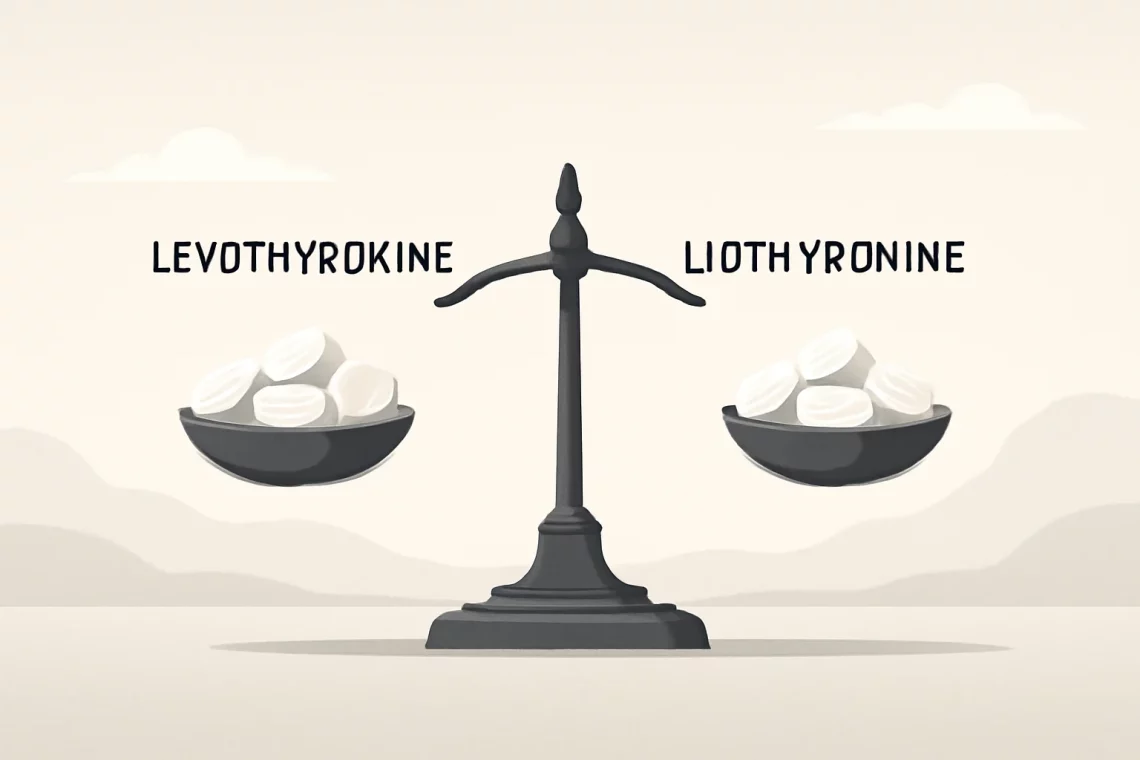
Levothyroxine vs Liothyronine: Choosing the Right Thyroid Medication
Levothyroxine and liothyronine are two medications commonly prescribed to manage thyroid hormone levels in individuals with thyroid disorders. The thyroid gland, a small butterfly-shaped gland located in the neck, plays a critical role in regulating metabolism, energy production, and overall hormonal balance in the body. When the thyroid is underactive, or hypothyroid, it can lead to symptoms such as fatigue, weight gain, depression, and sensitivity to cold.
Levothyroxine is a synthetic form of thyroxine (T4), a hormone that the thyroid naturally produces. This medication aims to restore normal hormone levels, alleviating the symptoms of hypothyroidism. On the other hand, liothyronine is a synthetic form of triiodothyronine (T3), which is a more active form of thyroid hormone. While T4 is converted into T3 in the body, some patients may benefit more from direct supplementation with T3, particularly those who do not respond adequately to levothyroxine alone.
The choice between levothyroxine and liothyronine can be complex and often depends on individual patient needs, preferences, and specific thyroid conditions. Understanding the differences, benefits, and potential side effects of these medications is crucial for anyone considering treatment options for thyroid dysfunction.
Understanding Levothyroxine
Levothyroxine is the most commonly prescribed medication for hypothyroidism. It mimics the action of the natural hormone thyroxine (T4) that the thyroid gland produces. When a patient is diagnosed with an underactive thyroid, doctors typically prescribe levothyroxine to restore normal hormone levels and alleviate symptoms associated with hypothyroidism.
The effectiveness of levothyroxine lies in its ability to increase T4 levels in the bloodstream. Once ingested, levothyroxine is absorbed in the gastrointestinal tract and converted into T3 in the body, which is the active form of the hormone. T3 is responsible for regulating various bodily functions, including metabolism, heart rate, and temperature regulation.
Patients taking levothyroxine usually start with a low dose, which is gradually adjusted based on regular blood tests that monitor thyroid hormone levels. It is crucial for patients to remain consistent with their medication, as fluctuations in dosage can lead to symptoms of either hypothyroidism or hyperthyroidism.
Levothyroxine is typically taken in the morning on an empty stomach to enhance absorption. Patients are advised to wait at least 30 to 60 minutes before consuming food or other medications to ensure optimal effectiveness. Common side effects may include weight changes, hair loss, and changes in heart rate, but these are usually manageable with proper dosage adjustments.
For many, levothyroxine is a lifelong treatment. Regular follow-ups with healthcare providers are essential to monitor thyroid function and make necessary adjustments to the medication regimen. While levothyroxine is effective for most individuals, some may experience persistent symptoms despite treatment, prompting discussions about alternative therapies.
The Role of Liothyronine
Liothyronine, the synthetic form of triiodothyronine (T3), is another option for patients with thyroid disorders. Unlike levothyroxine, which primarily provides T4, liothyronine directly supplies the body with T3, the more potent and active thyroid hormone. This distinction can make a significant difference for some patients, particularly those who have difficulty converting T4 to T3 or who require a faster-acting medication.
Liothyronine can be particularly beneficial for individuals who experience persistent symptoms of hypothyroidism while on levothyroxine. Some studies suggest that a combination therapy approach, using both levothyroxine and liothyronine, may yield better results for certain patients. This combination can help achieve a more balanced thyroid hormone level and alleviate symptoms such as fatigue, depression, and cognitive difficulties.
The onset of action for liothyronine is quicker than that of levothyroxine, making it an attractive option for patients who need immediate symptom relief. However, this rapid action also means that monitoring is crucial, as the risk of overdose and resultant hyperthyroidism can be higher with liothyronine.
Patients considering liothyronine should engage in thorough discussions with their healthcare providers. Proper titration and monitoring of T3 levels are essential to prevent potential complications. Additionally, the choice between liothyronine and levothyroxine may depend on individual responses to therapy, lifestyle factors, and personal preferences regarding medication administration.
While liothyronine can be an effective treatment, it is generally prescribed less frequently than levothyroxine due to its cost and the potential for more severe side effects if not carefully managed. That said, for certain patients, it can be a game-changer in achieving optimal thyroid function.
Comparative Benefits and Drawbacks
When comparing levothyroxine and liothyronine, several factors come into play that can influence a patient’s treatment choice. Both medications aim to manage thyroid hormone levels, but they do so in different ways, each with its respective advantages and disadvantages.
Levothyroxine is often preferred for its long half-life and stable release into the bloodstream. This stability allows for once-daily dosing, making it convenient for many patients. Furthermore, levothyroxine has a well-established safety profile and is generally well-tolerated. However, some patients may experience a lack of symptom relief, leading them to seek alternatives.
On the other hand, liothyronine may provide quicker relief of symptoms due to its rapid action. This can be particularly appealing for patients who need immediate improvement in their quality of life. However, due to its shorter half-life, liothyronine often requires multiple doses throughout the day, which can be less convenient.
Another consideration is cost and insurance coverage. Levothyroxine is generally less expensive and more widely covered by insurance plans compared to liothyronine. This financial aspect can be a crucial factor for patients when choosing a treatment plan.
The decision between levothyroxine and liothyronine should always be made in consultation with a healthcare provider. Individual responses to these medications can vary widely, and what works for one patient might not be effective for another. Regular monitoring of thyroid function is essential in both cases to ensure optimal management of thyroid disorders.
Ultimately, the choice of medication will depend on individual health needs, lifestyle considerations, and the specific thyroid conditions being treated. Patients should feel empowered to discuss their options and any concerns with their healthcare providers to find the best approach for their situation.
**Disclaimer:** This article is not intended as medical advice. For any health-related issues or concerns, please consult a qualified healthcare professional.




